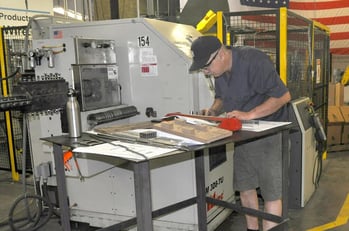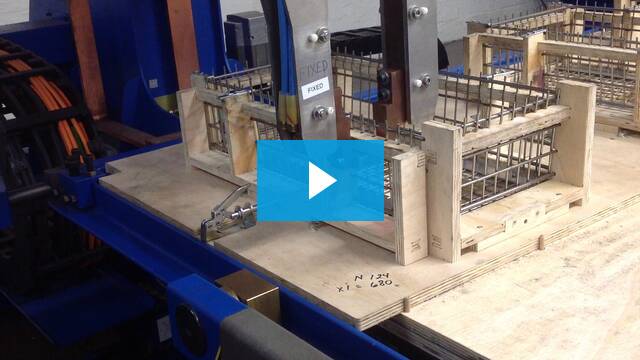 A little while ago, Pam Mangas of Gray Construction’s online GrayWay publication sat down for an interview with one of Marlin Steel’s robot technicians, Nathan Myers.
A little while ago, Pam Mangas of Gray Construction’s online GrayWay publication sat down for an interview with one of Marlin Steel’s robot technicians, Nathan Myers.
In the brief Q&A, Mangas asked Nathan about his job, its requirements, what he found most rewarding about it, and what advice he’d give to others interested in being a robot technician for a manufacturing company.
What were Mr. Myers’ insights into the world of using robotics technology for manufacturing? How is the adoption of automated manufacturing technology changing the face of the manufacturing industry?
The Evolution of Manufacturing Labor
Here at Marlin Steel, Nathan is a robot technician. Each day, he sets up, programs, and operates the robotic manufacturing equipment that Marlin uses to bend, cut, and weld both sheet metal and wire racks, baskets, and shelves for clients.
This job is radically different from what used to be the norm for Marlin employees back in 1998. In fact, Marlin didn’t even have robot technicians back then. At that time, Marlin did all of its major manufacturing tasks by hand.
Work was slow, arduous, and frequently dangerous. Injuries on the factory floor were all too common, several employees lost fingers or even eyes while working to shape metal manually.
Soon after the company was bought out by its current owner in 1998, there was a major change in the way manufacturing was handled. Rather than rely on purely manual methods of getting work done, Marlin Steel began to adopt the use of manufacturing robots for the heavy physical labor of bending metal.
The introduction of robotic manufacturing tech allowed Marlin’s workers to take on a supervisory role, watching over and operating machines that do the heavy labor. Work that was once purely physical in nature became more cerebral, demanding a new set of skills from workers.
Working Smarter & Producing More
 As Nathan pointed out in his interview with GrayWay’s Pam Mangas, the position of robot technician “requires strong mathematical and mechanical skills, and the ability to interpret technical information and drawings.”
As Nathan pointed out in his interview with GrayWay’s Pam Mangas, the position of robot technician “requires strong mathematical and mechanical skills, and the ability to interpret technical information and drawings.”
In other words, manufacturing with robots is more about brainpower than muscles. A robot technician has to know how to program the robot to achieve specific goals, as well as be able to maintain the robot to stay in top working order. These are tasks that focus on the technician’s ability to use mechanical reasoning and knowledge of computers. To the right, you can see one of our factory automation machines at work, the IDEAL Welding machine!
To be a manufacturing worker in a modern factory, you need to be educated, with strong math and reading comprehension/communication skills. In fact, using certain robots might require taking additional special training from the robot’s manufacturer, so it’s important to always be willing to learn more.
The use of manufacturing automation makes an enormous impact on employee productivity. This is because robots, unlike humans, don’t get tired or suffer from repetitive motion stress injuries when making the same bend in metal over and over again. When Marlin was relying on heavy manual labor to make commodity baskets, a great worker might assemble as many as 20 baskets a day. With manufacturing automation tools, that same worker could easily assemble a basket every few minutes.
This increased productivity makes each worker at a modernized factory a key part of the factory’s success. As Nathan said in his interview, “the use of robotics contributes greatly to our company’s profitability and competitiveness in the global marketplace, and it’s highly rewarding knowing the work we do plays a key role in the company’s success.”
At Marlin Steel, the increased productivity of each employee empowers the company to invest more in safety, training, and employee compensation. Thanks to automation, the face of manufacturing has changed.
What it takes to be a Manufacturing Worker Today
In decades past, physical endurance and strength were among the most desirable traits a manufacturing worker could have. This has changed with the adoption of manufacturing robots.
Now, education and mechanical skills are among the most desirable traits that a manufacturing worker can have. As Nathan points out in his interview with GrayWay, “it is important to enter the workforce with some technical training… and to never stop learning. Having a good work ethic and a willingness to continuously improve and refine your skills are key to success in this field.”
Those interested in a manufacturing career should have a high school education, with at least some technical training being preferred. On top of that, being willing and able to keep on learning is important, as new manufacturing equipment and operating systems are constantly being made.
Learn more about how Marlin’s employees use advanced manufacturing automation and computer software to provide clients with superior custom metal form solutions in the case study at the link below:



.gif)


